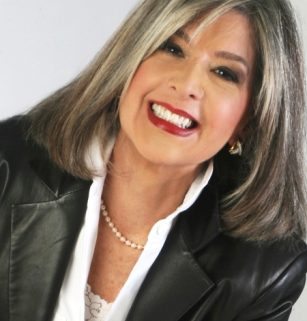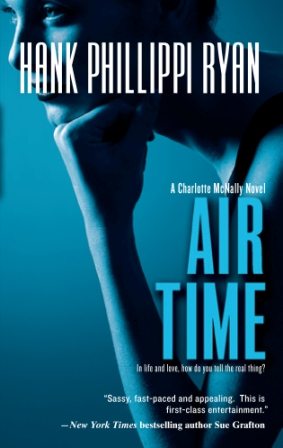Hank Phillippi Ryan: Hiding In Plain Sight
Award-winning investigative reporter Hank Phillippi Ryan is on the air at Boston’s NBC affiliate. Her work has resulted in new laws, people sent to prison, homes removed from foreclosure, and millions of dollars in restitution. Along with her 26 EMMYs, Hank’s won dozens of other journalism honors. She’s been a radio reporter, a legislative aide in the United States Senate and an editorial assistant at Rolling Stone Magazine working with Hunter S. Thompson.
Her first mystery, the best-selling PRIME TIME, won the Agatha for Best First Novel. It was also was a double RITA nominee for Best First Book and Best Romantic Suspense Novel, and a Reviewers’ Choice Award Winner. FACE TIME and AIR TIME are IMBA bestsellers, and AIR TIME was just nominated for the AGATHA Award for Best Novel of 2009. (Of AIR TIME, Sue Grafton says: “This is first-class entertainment.”) DRIVE TIME, February 2010 from MIRA Books, just earned a starred review from Library Journal.
Hank’s short story “On The House” is now an AGATHA nominee for Best Short Story of 2009.
She is on the national board of Mystery Writers of America.
Her website is www.HankPhillippiRyan.com
HIDING IN PLAIN SIGHT

When you’re undercover and carrying a hidden camera, there’s no room for error. And as an investigative reporter, I know the scoop: You never know when you’ll get caught.
I was wearing thick glasses instead of my usual contacts. My on-air hair had never looked so disheveled. Even my friends wouldn’t recognize me without my usual television makeup. I was undercover and in disguise. At least I thought so. But the doctor’s wandering eyes were making me nervous. No question, the renegade doctor was looking at my chest. And that presented a major problem.
A source had told us this guy was lying to patients about his history as an obstetrician. He’d been hammered with malpractice suits, and lost, time after time after time. And the state had suspended his license. But state laws at the time didn’t require him to tell that to potential patients. Back then, to find a doctor’s legal history, a patient would have to search court files, which in some cases were sealed. Our TV news story, tentatively titled Private Practices, would explore whether doctors’ legal histories should be easier to check. We thought the public had a right to know.
What I hoped the “doctor” didn’t know: that tiny cigarette burn hole on the front pocket of my rumpled denim work shirt was actually the opening for a tiny camera lens. (We call it button-cam.) A thin wire snaked down from behind it, under my shirt, and tucked under my belt. Attached to that, and zipped into my goofy-looking fanny pack, was the guts of the hidden camera. I hoped the lens was pointed at his face. I hoped the tape was rolling in my pack. And I sure hoped Doctor X didn’t realize it.
I silently chanted my mantra. Rule number one of undercover shooting: The target doesn’t know. The target doesn’t know.
The last thing this guy figured was that the middle-aged couple sitting in his low-rent office were actually a television reporter and producer posing as husband and wife. But even though what we were doing was perfectly legal, and for the benefit of the public, and on the side of the good guys-when you’re on the reporter side of the camera, there’s never a moment when you feel certain it will work. Every moment is stomach-twistingly tense.
But in television, if it’s not on video, it didn’t happen. And we had to get the video.
He kept looking at my chest. I ignored it. We finished the interview. Bingo. He kept his secret past a secret. And we got outta there. The next time he saw me was on TV.
Years ago, when I started going undercover, the equipment wasn’t as snazzy as it is now. And by snazzy, I mean small.
So back then, I’d have to cut a quarter-sized hole in the side of an old purse, and tuck a regular Hi-8 camera inside, using black electrician’s tape to hold the lens against the hole. Then I tied a flowery silk scarf over the strap of the purse. When the scarf was down, the lens was covered. And with the camera rolling, I’d only have pictures of the scarf. When I moved the scarf aside, the lens would show, and I could get pictures. Of course, at that point, the lens was also pretty visible. But that was as good as it was going to get.
So, with a fake ponytail sticking out from under a Red Sox cap, big glasses, no makeup, wearing a dowdy dress, and carrying that clunky scarf-covered camera, I went in posing as a potential victim at what a source had divulged was a recruitment meeting for a cult organization. A shady group was luring vulnerable young women into handing over their money in return for some “salvation.”
Out in the parking lot, I pushed the camera’s record button. I adjusted the scarf (and my phony persona), and walked through the door, pretending I was just another guest.
Standing in the back of the room, I assessed the situation, then moved the scarf aside. Rolling with video.
Smiling and soft-spoken girls, looking just out of college, circulated quietly, offering lemonade. One caught my eye from across the room, and I saw her decide to approach me. Closer. Closer. Too close. The scarf went over the lens.
I took the lemonade. I didn’t drink it. I was trying to look like someone who might be vulnerable to being brainwashed, but not too vulnerable. I was a little apprehensive about at the lemonade.
The music was loud. The lights were bright. A woman stepped to a podium at the front of the room. I knew my camera was still rolling. I knew the tape inside was only thirty minutes long. Thirty minutes of scarf was not going to cut it.
I moved the scarf aside.
And then–I felt a tap in my shoulder.
I turned. A man in a suit looked at me through narrowed eyes.
“What’s in your purse?” he asked.
In television, you’re only as good as your last story. And, I remember, I briefly wondered if this would be the last story I ever did.
But rule number two of undercover shooting: The best defense is a good offense.
Scarf down. “You’re making me uncomfortable,” I said, making my voice edgier. “Are you supposed to be asking women that?”
He turned on his heel. Outta there. And then I high-tailed it for the door. Outta there.
The story was a blockbuster. And the cult church is no more. And now in Massachusetts, doctors must list their malpractice cases on state-mandated public profiles.
The high stakes and the high-stress. The decisions and the deadlines. And hoping to change the world a bit. After more than thirty years in television, I want the fictional reporter Charlotte McNally to show readers the authentic inside scoop on reporting. The good news. And the bad news.
AIR TIME, the third of the Charlotte McNally Mystery series and just nominated for the AGATHA for Best Mystery of 2009, goes behind the scenes of big-city airports, where Charlie discovers a scheme so timely and workable you’ll wonder why someone hasn’t tried it. And I promise you, you’ll never look at air travel the same way.
In AIR TIME, Charlie (using a method you’ll now recognize) begins her undercover investigation into murder and an international smuggling ring by carrying a hidden camera into-well, I won’t give that away.
In DRIVE TIME, Charlie uses another undercover technique: hiding in plain sight. But that’s a blog for another day.
But let’s just say: Been there. Done that.







Hank, your writing is so good it’s a delight to read, whether you’re blogging insider info or becoming the voice of the fictional Charlie McNally. Love all your books. More power to ya! Chris
Thanks Queen! How marvelous–thank you so much for your very kind words. It’s just–inspirational to hear. And yes, I love my work–fiction, and non-fiction!
Hank – I read Prime Time & loved it. Charlotte’s a great character. I’m sure a lot of your readers can easily relate to her. I intend to work my way thru your books. Congrats on your success so far & I wish you much more. Keep those books coming.
Interesting post. You have a lot of guts, standing up to those dangerous people. Keep safe.
Thanks, all! So nice of you to drop by.
Yes, the world of going undercover is never a dull moment!
And you never know–When I do speeches, I always tell the audience “I’m not wearing a hidden camera.” And they always laugh. And then I say–how do you know I’m telling the truth? And of course,they realize, don’t.
I agree. Hank is great. Not only is she a fabulous writer, she’s a wonderful person and a good friend with a very kind heart.
Hank you are amazing. How funny about the scarf and the bag. Glad it worked out for you. Thanks for sharing your interesting life with us. Thank you Lee for all the info and for bringing us this interesting lady.
Hank is amazing! Congratulations on all her success! I loved Drive Time!
Lee and Hank- thanks for sharing this. Hank, congrats on all your success. Definitely worth reading.